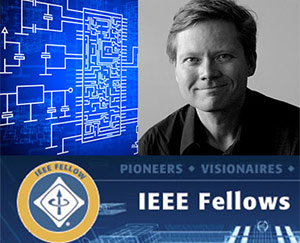Dinda Named 2015 IEEE Fellow
Prof. Peter Dinda has been named a Fellow of the Institute of Electrical and Electronics Engineers (IEEE).
Prof. Peter Dinda has been named a Fellow of the Institute of Electrical and Electronics Engineers (IEEE).
Prof. Dinda was cited “for contributions to virtualization technologies in adaptive and parallel computing.” His work, including the Virtuoso and V3VEE projects at Northwestern, has been influential in grid, cloud, and high performance computing (HPC) and networking. It continues to this day, with a current focus on virtualization-based operating systems for high performance computing that forms a component of the national effort for exascale computing.
Less than one in one thousand of IEEE members are honored in this manner each year.
IEEE Fellow is the highest grade of membership in the IEEE and is recognized by the technical community as a prestigious honor and an important career achievement.
 In an influential paper from 2003, Prof. Dinda and his collaborators articulated a vision for grid computing using virtualization that foreshadowed the modern day “Infrastructure as a Service” cloud model. Recognizing at this time the importance of network virtualization in a distributed environment, his Virtuoso Project developed one of the first purely software-based networking systems to support collections of far flung, migrating virtual machines. His group, the Prescience Lab then created some of the first algorithms and tools to automatically infer resource demand and supply in a virtualized environment, and dynamically adapt to them using the mechanisms of host and network virtualization.
In an influential paper from 2003, Prof. Dinda and his collaborators articulated a vision for grid computing using virtualization that foreshadowed the modern day “Infrastructure as a Service” cloud model. Recognizing at this time the importance of network virtualization in a distributed environment, his Virtuoso Project developed one of the first purely software-based networking systems to support collections of far flung, migrating virtual machines. His group, the Prescience Lab then created some of the first algorithms and tools to automatically infer resource demand and supply in a virtualized environment, and dynamically adapt to them using the mechanisms of host and network virtualization.
Since 2007, Prof. Dinda’s group has been focusing on the host, for which they and their collaborators in the V3VEE Project developed a new open-source virtualization codebase (the Palacios Virtual Machine Monitor). An important goal for Palacios was to demonstrate the feasibility of virtualization in HPC, even at very large scales, and this has been achieved for petascale supercomputers. The V3VEE Project has been influential on thinking for the design of a next generation systems software stack for even larger scale computing. His group is now a part of the Hobbes Project, an effort to build such a stack that currently spans 4 national labs and 10 universities.
The IEEE comprises over 400,000 members (over 60,000 in the Computer Society) and is a leading authority on a wide variety of areas ranging from aerospace systems, computers and telecommunications to biomedical engineering, electric power and consumer electronics. The IEEE publishes 30 percent of the world’s literature in the electrical and electronics engineering and computer science fields, has developed more than 900 active industry standards, and sponsors nearly 400 international technical conferences each year.
